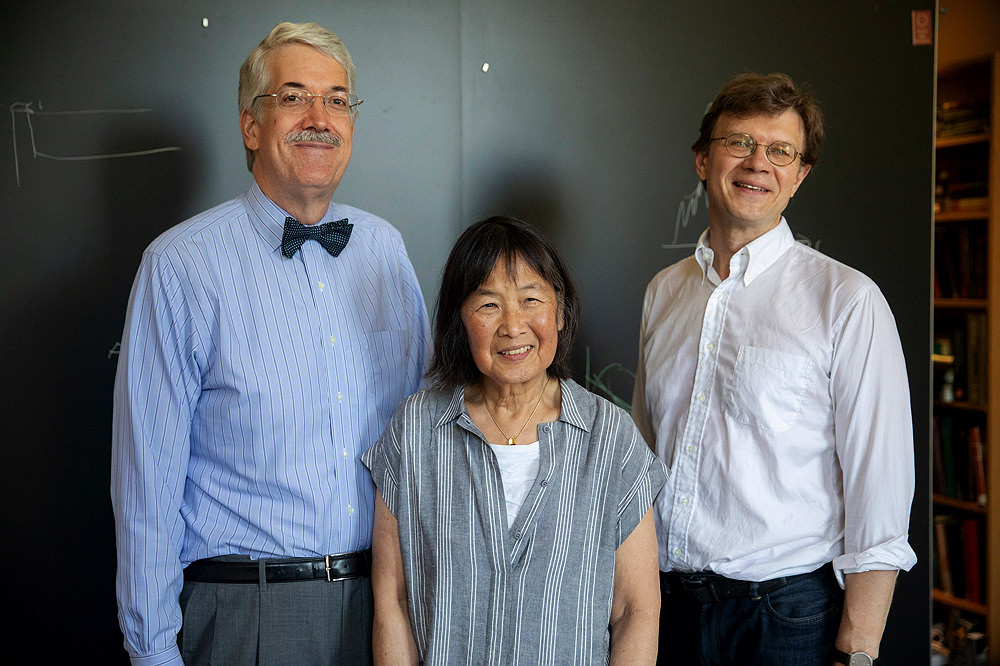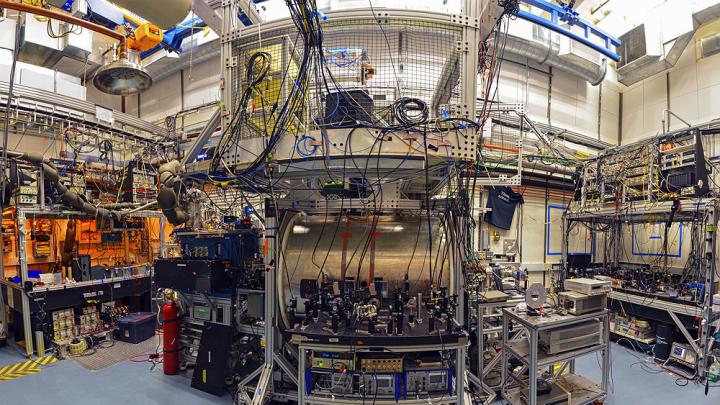Quantum science—the physics and engineering of the world at sub-microscopic scales—got a boost today as Harvard formally announced an initiative that will combine basic and applied research into the realm of the very small, as well as foster collaborations with partners from government, industry, and peer institutions. Harvard president Lawrence S. Bacow, in a University announcement, declared: “The diversity of expertise among our faculty creates a nutrient-rich environment in which this emerging discipline can flourish, and I am excited to see the ways in which collaboration with other partners speeds progress.”
Led by its co-directors—Silsbee professor of physics John Doyle, Tarr-Coyne professor of applied physics and of electrical engineering Evelyn Hu, and Leverett professor of physics Mikhail Lukin—the Harvard Quantum Initiative (HQI) will blend basic-science exploration with “solution-driven” quantum engineering. The Faculty of Arts and Sciences (FAS) and the Harvard Paulson School of Engineering and Applied Sciences (SEAS) expect to coordinate their hiring of faculty members who work in this area, which will help to build the quantum science and engineering initiative rapidly. Christopher Stubbs, interim dean of science for FAS, said that “FAS has two relevant searches under way at present, with more to come.” And SEAS dean Francis J. Doyle III added that he sees “clear opportunities to hire in electrical engineering, computer science, and applied physics” to support the initiative.

Harvard Quantum Initiative co-directors John Doyle, Evelyn Hu, and Mikhail Lukin.
Photograph by Kris Snibbe/HPAC
In addition, HQI is establishing relationships with Lincoln Labs, a defense department research center; with area startups and established companies (perhaps including Zapata Computing, a startup co-founded by a former Harvard faculty member with the aim of developing quantum-computing software and algorithms to solve problems in industry); and with colleagues downriver at MIT, deepening a collaboration in quantum science between the two institutions that began almost two decades ago with the establishment of the Center for Ultracold Atoms, a National Science Foundation Physics Frontier center.
Combining Science and Engineering
HQI co-director John Doyle (no relation to the dean) said in an interview that the initiative “is a blend of basic science and applied science or engineering,” and described engineering as “a related but separate intellectual discipline” with “different intellectual ideas and goals. We hope the initiative will make the communication and work between these people—that kind of integration and synergy—stronger.”
Eventually, according to the initiative’s co-directors, the aim is to establish a quantum-science curriculum, with a particular focus on computing, communications, and sensing technologies. Harvard currently offers courses in quantum mechanics at both the graduate and undergraduate level, in addition to courses in related fields such as solid-state physics (a.k.a., materials science) and photonics.
Quantum behaviors—meaning physical properties linked to the small size or discrete energy states of individual atoms (the term “quantum” comes from the number—quanta—of an atom’s electrons) include particles that pop in and out of existence, even in a vacuum; dual states of matter known as superpositions; entanglement, in which the spin of an electron is diametrically opposed to the spin of its entangled pair, no matter where or how far away in the universe that entangled counterpart is; and particles that can pass through a solid material without slowing down or leaving a hole. (For more on quantum science and engineering, see “Thinking Small.”)
“We use what we call quantum mechanics as a resource,” said Doyle in that same interview, “either to sense the world or to make new kinds of computation” such as a quantum simulation—a special kind of computation that can be used to understand, for instance, the behavior of materials. “On the sensing side,” he continued, Harvard researchers are developing quantum objects embedded in diamond crystals that can be used as biological sensors—and “a large number of professors here are working cooperatively to turn those into sensors for neurons. We also use [quantum mechanics] for things like precision measurement, to probe even finer scales of the world—such as at the scale of particle physics.”
What makes the launch of HQI timely, said Doyle, is the newfound ability to control physical behaviors at the single quantum-object level, such as an atom. For example, researchers can now trap particles in layered quantum materials, or capture them with beams of light, and then probe their properties in ways that make it possible to harness their oddities. Such capabilities have enabled scientists to begin assembling the parts that might one day lead to powerful, superfast quantum computers. A field once called “voodoo physics,” in other words, is poised to emerge from the realm of the theoretical into the domain of applied technology.
Read the University announcement here.








